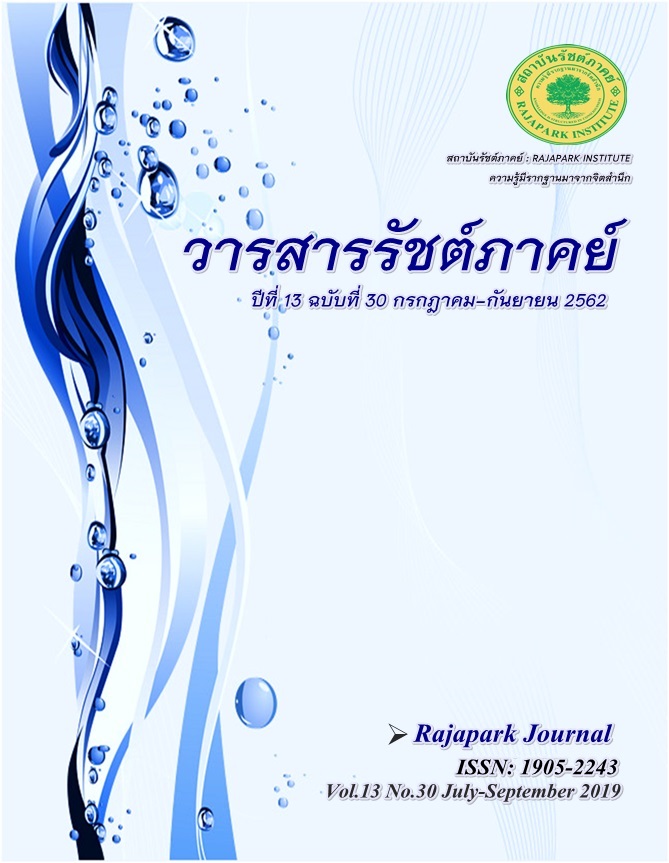Mayoral Leadership and the Effectiveness of Municipalities in Thailand
Main Article Content
Abstract
The objectives of this research were 1) to study and compare the level of leadership (Inspirational Motivation, Idealized Influence, Intellectual Stimulation, and Individualized Consideration) of the mayors in Thailand 2) to study and compare the level of the Effectiveness of Thai Municipalities. Survey research was designed for collecting information from officers of the municipalities (excepted Bangkok and Pattaya) by questionnaires using. Sample of 277 were recruited in the study. Both descriptive statistics and inferential statistics such as F-test was used for data analysis by statistical significance at 0.05 and 0.01 The results showed that 1. The leadership of the mayor in each municipality found that Municipal Office of Muang Kelang Nakhon, Tha Klong Town and Hua Hin had the most leadership of Inspirational Motivation and Municipal Office of Khuan Lang, Nong Prue and Sila had the most leadership of Idealized Influence. 2. Municipal Office of Sila had the most of the Effective. 3. The leadership of each mayor of the municipality were significantly different. 4. The effectiveness of each municipality were significantly different.
Article Details

This work is licensed under a Creative Commons Attribution-NonCommercial-NoDerivatives 4.0 International License.
Views and opinions appearing in the Journal it is the responsibility of the author of the article, and does not constitute the view and responsibility of the editorial team.
References
Avolio, B. J., Waldman, D., & Yammarino, F. J. (1991). Leading in the 1990s: The Four I's of Transformational Leadership. Journal of European Industrial Training, 15(4), 9-16.
Barker, D. G. (1992). Changing Social Values in Europe. Business Ethics: A European Review, 1(2), 91-107.
Bass, B. M., & Avolio, B. J. (1994). Improving organization effectiveness through transformational leadership. Thousand Oaks, CA: Sage.
Bohn, H. (2002). Government Asset and Liability Management in an Era of Vanishing Public Debt. California: Santa Barbara.
Chandasuwan, P., Duangpanya, E., Seawataporn, C., & Phoompakdee, A. (2012). Transformational Leadership, Organizational Culture, Learning Organization and Effectiveness of Subunits within Stations of Metropolitan Police Division: Path Analysis. Romphruek Journal, 30(1), 89-116.
Chaum, T. (2015). A Management Effectiveness Model of Sub-District Municipalities in Central Region of Thailand. Doctor of Philosophy, Siam University.
Dhiravegin, L. (2007). Evolution of Thai government politics. Bangkok: Thammasat University.
Khanapsak, S. (2015). Customer Satisfaction with the Services of Local Administration for the Fiscal Year 2014. Inthaninthaksin Journal, 10(1), 35-51.
Lertpaitoon, S., & Wantanakorn, M. (2003). The concept of strong management with direct mayoral election in Thailand. Democracy Development Study Center, Bangkok: Thammasat University.
Mayer, R. C., Davis, J. H., & Schoorman, F. D. (1995). An Integrative Model of Organizational Trust. The Academy of Management Review, 20(3), 709–734.
Naipinit, A., Kroeksakul, P. & Promsaka Na Sakolnakorn, T. (2014). Adjustment under Globalization. SKRU ACADEMIC JOURNAL. 7(1), 1-12.
Pratchapruk, T. (2017). Public Administration Vocabulary. Bangkok: Chulalongkorn University Press.
Rattanadilok Na Phuket, P. (2007). Leadership and practical guidelines for executives local under the context of change. Local Administration Journal, 1(2), 121-148.
Reddin, W. J. (1970). Managerial Effectiveness. New York: McGraw-Hill.
Veerawut, S. (2011). Factors Affecting Effectiveness of the Primary Schools Under the Office of Basic Education Commission in Changwat Nonthaburi. Journal of Administration and Development, Mahasarakham University, 3(3), 111-126.
Vinitwatanakhun, W. (2002). Factors affecting organizational effectiveness of nursing institutes in Thailand. Retrieved March 14, 2019, form https://www.journal.au.edu/au_techno/2002/apr2002/article8.pdf


